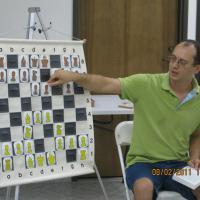
Boosting the Knowledge
The chess.com University was reopened at the end of May and since then many people asked what more than the video lectures, articles, mentor courses and enormous sources of information on the site one can learn.
Indeed, the users of this site are a bit spoiled of useful information, that good it is  but one can always learn something new.
but one can always learn something new.
The instructors of the University already produced some seminars and I did a couple of them.
The second one was about the opposition in the pawn endgames.
While this theme might seem quite prosaic I believe that it is essential to any chess player who wants to achieve certain results.
After all, the kings are the only remaining pieces at this stage of the game and needs to know how to handle them.
Certain theoretical knowledge is required to understand the basics of the opposition:
And some exact positions are a must for any practical player. For instance this one;
This position was an exception, therefore it is useful to be learned by herat. If the king reaches the sixth (third) rank and the pawn (not a corner one!) is behind it it is always a win, no matter who holds the opposition. This makes it easy for the side who converts the advantage to foresee what needs to be done even if you are very low on time. You grab the opposition, push your king towards that square and then simply advance the pawn without any fear. Opposition is not that important any more!
Knowing how to win when having the opposition is one thing. But knowing how to gain the opposition is even more useful.
One method is to use the reserved pawn moves:
By the way, the method chosen by White to win the game is very characteristic for many endgames. first you activate all your remaining pieces to provide the maximum support of the passer and only then you dare to advance it.
Knowledge about the reserved pawn moves and another typical way to oppose the king- the distant opposition helps White survive in this endgame:
And in the following sample the defender needed to avoid the mined squares in order to maintain the opposition:
A seminar will also teach you how to make a difference between the distant and the normal opposition and when to apply them. In the following sample a strong player lacked knowledge and could not solve the problem:
A painful defeat! If a mistake in the opening or the middle game can be compensated with energetic play in the pawn endgames such a thing is impossible!
I did not mention yet the knight opposition which is usually used to outflank the opponent's king and kick it away from his its pawns:
Or the bishop opposition. In this one one is waiting fot the opponent to make a decision and only after that to occupy the usual one. The advanced knowledge will help Black save the following situation:
You feel like this is a study without great practical value?
Maybe, but how about this recent sample then:
GM Gurevich knew what to do as he knew about the bishop opposition.
How about you?
There are many more things to be said about the opposition; but I hope that you got the idea of the University- it provides concentrated knowledge on essential questions.
Tomorrow is my third course about the tactics in the rook endgames and my colleagues provide many more interesting topics.
Feel free to visit the University page and ask us the questions that you need to.
Success!